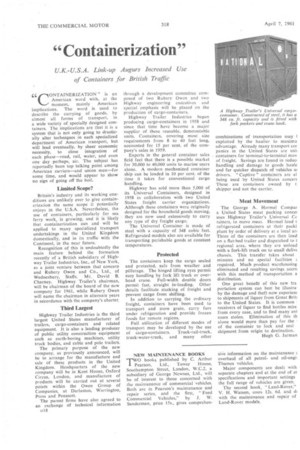"Containerization"
Page 84

If you've noticed an error in this article please click here to report it so we can fix it.
U.K.-U.S.A. Link-up Augurs Increased Use of Containers for British Traffic
GGriONTAINERIZATION " is an American word with, at the moment, mainly American implications. The word is used to describe the carrying of goods, by almost all forms of transport, in a wide variety of specially designed containers. The implications are that it is a system that is not only going to drastically alter techniques in each specialized department of American transport, but will lead eventually, by sheer economic necessity, to close integration of each phase—road, rail, water, and even one day perhaps, air. The subject has reportedly been top talking point among American carriers—and union men—for some time, and would appear to show no sign of going off the boil.
Limited Scope?
Britain's industry and its working conditions are unlikely ever to give containerization the same scope it potentially enjoys in the U.S.A. Nevertheless, the use of containers, particularly for sea ferry work, is growing, and it is likely that containerization can and will be applied to many specialized transport undertakings in the United Kingdom domestically, and in its traffic with the Continent, in the near future.
Recognition of this is undoubtedly the main feature behind the formation recently of a British subsidiary of Highway Trailer Industries, Inc., of New York, as a joint venture between that concern and Rubery Owen and Co., Ltd., of Wednesbury, Staffs. Mr. David B. Charney. Highway Trailer's chairman, will be chairman of the board of the new company for 1961, while Rubery Owen will name the chairman in alternate years in accordance with the company's charter.
Third Largest
Highway Trailer Industries is the third largest United States manufacturer of trailers, cargo-containers and related equipment. It is also a leading producer of public utility construction equipment such as earth-boring machines, utility truck bodies, and cable and pole trailers.
The primary purpose of the new company, as previously announced, will be to arrange for the manufacture and sale of these products in the United Kingdom. Headquarters of the new company will be in Kent House, Oxford Circus, London, and manufacture of products will be carried out at several points within the Owen Group of Companies, at Darlaston, Warrington, Press and Pensnett.
The parent firms have also agreed to an exchange of technical information ol8 through a development committee composed of two Rubery Owen and two Highway engineering executives and special emphasis will be placed on the production of cargo-containers.
Highway Trailer Industries began producing cargo-containers in 1958 and since that time have become a major supplier of these reusable, demountable units. Containers, covering most size requirements from 8 to 40 feet long, accounted for 15 per cent, of the company's sales in 1959.
Experts in the general container sales field feel that there is a possible market for 30,000 to 40,000 units to marine users alone. A modern mechanized container ship can be loaded in 10 per cent. of the time it takes for conventional cargo handling.
Highway has sold more than 5,000 of its Universal Containers, designed in 1958 in collaboration with two United States freight carrier organizations. Although these containers were originally designed for the household goods moving, they are now used extensively to carry any type of dry freight cargo, The Universal Container is made of steel with a capacity of 348 cubic feet. Refrigerated models also are available for transporting perishable goods at constant temperatures.
Protected
The containers keep the cargo sealed and protected, safe from weather and pilferage. The hinged lifting eyes permit easy handling by fork lift truck or overhead crane. Full-width double doors permit fast, straight in-loading. Other details facilitate . stacking of freight and prevent cargo from shifting.
In addition to carrying the ordinary freight, containers have been used to transport and store grain, carry furs under refrigeration and provide frozen foods for remote regions.
Full utilization of different modes of transport may be developed by the use of cargo-containers. Truck-rail-truck, truck-water-truck, and many other
combinations of transportation may I exploited by the haulier to maximu advantage. Already many transport cot panics in the United States are usit containers for terminal-to-terminal mov of freight. Savings are found in reduo handling and damage to goods haute and far quicker dispatch of vehicles al
drivers. Captive" containers are at being used by United States concert These are containers owned by t shipper and not the carrier.
Meat Movement The George A. Hormel Compar a United States meat packing concei uses Highway Trailer's Universal Cc tainers, to move meat. Hormel load t refrigerated containers at their packi plant by order of delivery at a local an Three of the containers are then load on a flat-bed trailer and dispatched to t regional area, where they are unload with a fork-lift truck on to small delive chassis. This transfer takes about minutes and no special facilities required. Much product warehousing eliminated and resulting savings accru with this method of transportation a distribution.
One great benefit of this new tra portation system can best be illustra by the damage and theft now experient to shipments of liquor from Great Brit to the United States. It is common receivers of liquor to find bottles miss from every case, and to find many eril cases stolen. Elimination of this th alone would more than pay for the of the container to lock and seal shipment from origin to destination.
Hugh G. Jarman




























































































































































